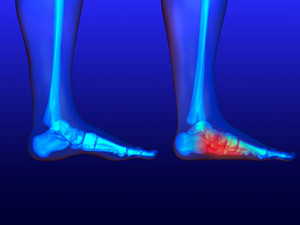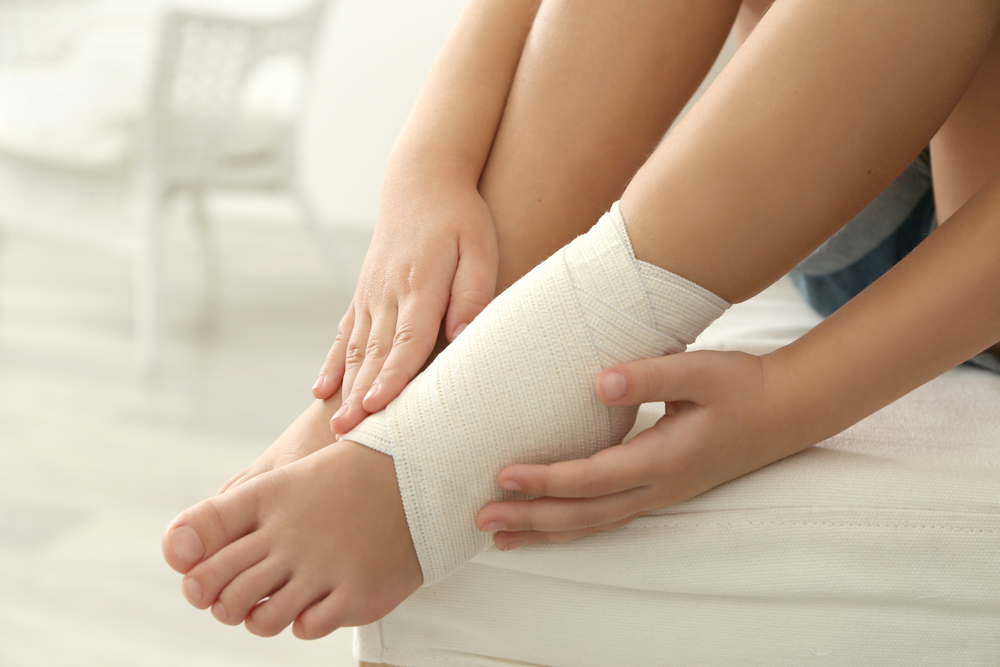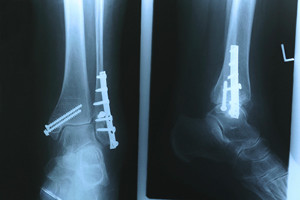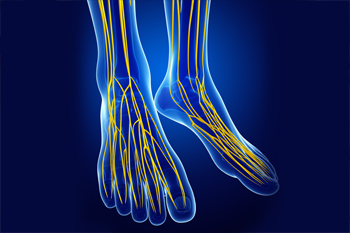
A  majority of babies are born with flat feet, and their arch generally develops as the aging process occurs. However, in some cases, the foot remains flat. The medical term for this condition is known as pes planus, and approximately one in ten children have flat feet throughout adulthood. Flat feet may form in adulthood as a result of being overweight, or possibly from a bone misalignment. Additionally, wearing shoes that do not fit correctly may lead to getting flat feet. If you are afflicted with flat feet, it is strongly suggested that you are under the care of a podiatrist who is able to help you to choose shoes that are correct for you.
majority of babies are born with flat feet, and their arch generally develops as the aging process occurs. However, in some cases, the foot remains flat. The medical term for this condition is known as pes planus, and approximately one in ten children have flat feet throughout adulthood. Flat feet may form in adulthood as a result of being overweight, or possibly from a bone misalignment. Additionally, wearing shoes that do not fit correctly may lead to getting flat feet. If you are afflicted with flat feet, it is strongly suggested that you are under the care of a podiatrist who is able to help you to choose shoes that are correct for you.
Flatfoot is a condition many people suffer from. If you have flat feet, contact the podiatrists from The Foot & Ankle Center of New Jersey. Our doctors will treat your foot and ankle needs.
What Are Flat Feet?
Flatfoot is a condition in which the arch of the foot is depressed and the sole of the foot is almost completely in contact with the ground. About 20-30% of the population generally has flat feet because their arches never formed during growth.
Conditions & Problems:
Having flat feet makes it difficult to run or walk because of the stress placed on the ankles.
Alignment – The general alignment of your legs can be disrupted, because the ankles move inward which can cause major discomfort.
Knees – If you have complications with your knees, flat feet can be a contributor to arthritis in that area.
Symptoms
Treatment
If you are experiencing pain and stress on the foot you may weaken the posterior tibial tendon, which runs around the inside of the ankle.
If you have any questions please feel free to contact our office located in Paramus, NJ . We offer the newest diagnostic and treatment technologies for all your foot and ankle needs.
Circulatory foot problems can cause pain, swelling, and mobility issues. Left untreated, poor circulation can lead to potentially life-threatening health complications. While circulatory issues are troublesome for anyone, poor circulation is particularly dangerous for senior citizens, who are more susceptible to developing it because of various deterioration to the body due to aging, as well as obesity, diabetes, and inactivity. If you or a senior citizen you love has cold, swollen, discolored, heavy, numb, or painful feet, or engorged or varicose veins, consult with a podiatrist right away. Prompt and proper medical attention can help manage poor circulation and slow or prevent the development of more serious conditions.
If you need your feet checked, contact the podiatrists of The Foot & Ankle Center of New Jersey. Our doctors will attend to all of your foot and ankle needs and provide you with quality treatment.
Geriatrics and Podiatry
When people age, some common issues that may occur are bone density loss, dry skin, poor circulation, and rough brittle nails. These issues may also affect your foot health if the necessary steps are not taken to alleviate the problems.
It is important to take care of your feet because feet that are injured or diseased can affect your overall health. Having painful feet hinders your ability to do daily activities or may decrease your willingness to do the things that you need to do.
Visiting Your Geriatrician
As we age, health problems become more likely, so it is essential to visit your doctor for check-ups to ensure that you are doing the best you can to take care of your health. It is recommended to check your feet frequently for any possible cuts, bruises, swelling, corns or any other irregularities.
Taking Care of Elderly Feet
Cracked or dry feet can be treated by applying moisturizer often. It is also important not to wear old socks because the older the sock is, the higher the possibility there will be that there is bacteria there. Wear fresh socks and make sure they fit properly.
Proper foot health means that you can have a more active lifestyle and you will not be bogged down by pain. Foot health also leads to good circulation, which is paramount for overall health.
If you have any questions, please feel free to contact our office located in Paramus, NJ . We offer the newest diagnostic tools and technology to treat your foot and ankle needs.
Gout is a form of arthritis caused by hyperuricemia—an overabundance of uric acid which crystallizes in a joint causing pain, swelling, redness, and tenderness. While gout can occur anywhere in the body, it usually manifests in the joints of the big toe. Historically, it was believed that overindulging in food and drink was the leading factor of developing gout. However, heredity may put a person more at risk of developing gout than originally thought. Still, a healthy diet and other precautionary measures may help reduce the amount of uric acid in your body, and can even reduce the symptoms and severity of gout. If your family history puts you at risk of developing gout, be proactive and contact a podiatrist today.
Gout is a foot condition that requires certain treatment and care. If you are seeking treatment, contact the podiatrists from The Foot & Ankle Center of New Jersey. Our doctors will treat your foot and ankle needs.
What Is Gout?
Gout is a type of arthritis caused by a buildup of uric acid in the bloodstream. It often develops in the foot, especially the big toe area, although it can manifest in other parts of the body as well. Gout can make walking and standing very painful and is especially common in diabetics and the obese.
People typically get gout because of a poor diet. Genetic predisposition is also a factor. The children of parents who have had gout frequently have a chance of developing it themselves.
Gout can easily be identified by redness and inflammation of the big toe and the surrounding areas of the foot. Other symptoms include extreme fatigue, joint pain, and running high fevers. Sometimes corticosteroid drugs can be prescribed to treat gout, but the best way to combat this disease is to get more exercise and eat a better diet.
If you have any questions please feel free to contact our office located in Paramus, NJ . We offer the newest diagnostic and treatment technologies for all your foot and ankle needs.
 The ankle is a joint that connects leg bones (the tibia and fibula) with a foot bone (talus), providing up-and-down movement, stability, and shock absorption for the foot. Ankle fractures typically occur when either or both of these leg bones break. Fractures are characterized as either stable (if talus moves normally), or unstable (if talus moves abnormally). To the average person, it can be hard to tell whether they are experiencing an ankle fracture or an ankle sprain—which occurs when the ligaments on the ankle are damaged. Some telltale signs of a fracture can be: a cracking sound when the injury occurs, numbness or tingling, pain over the ankle bone, or even a misshapen ankle. While both ailments are painful, an ankle fracture is much more serious. Consult with a podiatrist who will be able to diagnose the injury properly and provide necessary treatment.
The ankle is a joint that connects leg bones (the tibia and fibula) with a foot bone (talus), providing up-and-down movement, stability, and shock absorption for the foot. Ankle fractures typically occur when either or both of these leg bones break. Fractures are characterized as either stable (if talus moves normally), or unstable (if talus moves abnormally). To the average person, it can be hard to tell whether they are experiencing an ankle fracture or an ankle sprain—which occurs when the ligaments on the ankle are damaged. Some telltale signs of a fracture can be: a cracking sound when the injury occurs, numbness or tingling, pain over the ankle bone, or even a misshapen ankle. While both ailments are painful, an ankle fracture is much more serious. Consult with a podiatrist who will be able to diagnose the injury properly and provide necessary treatment.
Broken ankles need immediate treatment. If you are seeking treatment, contact the podiatrists from The Foot & Ankle Center of New Jersey. Our doctors can provide the care you need to keep you pain-free and on your feet.
Broken Ankles
A broken ankle is experienced when a person fractures their tibia or fibula in the lower leg and ankle area. Both of these bones are attached at the bottom of the leg and combine to form what we know to be our ankle.
When a physician is referring to a break of the ankle, he or she is usually referring to a break in the area where the tibia and fibula are joined to create our ankle joint. Ankles are more prone to fractures because the ankle is an area that suffers a lot of pressure and stress. There are some obvious signs when a person experiences a fractured ankle, and the following symptoms may be present.
Symptoms of a Fractured Ankle
If you suspect an ankle fracture, it is recommended to seek treatment as soon as possible. The sooner you have your podiatrist diagnose the fracture, the quicker you’ll be on the way towards recovery.
If you have any questions, please feel free to contact our office located in Paramus, NJ . We offer the newest diagnostic and treatment technologies for all your foot care needs.
Diabetic foot wounds are chronic ulcers that may appear on the feet of people who have diabetes. Because these wounds heal slowly and poorly, and often become infected, diabetic foot ulcers are a major cause of lower limb amputations. Preventing these wounds from occurring in the first place continues to be an important goal for maintaining the overall health of people with diabetes. You can help prevent wounds by practicing good foot hygiene and wearing shoes and socks when you are on your feet. Performing daily foot inspections, in which you check your feet for any abnormalities—such as cuts, scrapes, sores, discoloration, and pain or strange sensations—can help detect problems early on and improve treatment outcomes. For more information about diabetic foot health, please consult with a podiatrist.
Wound care is an important part in dealing with diabetes. If you have diabetes and a foot wound or would like more information about wound care for diabetics, consult with the podiatrists from The Foot & Ankle Center of New Jersey. Our doctors will assess your condition and provide you with quality foot and ankle treatment.
What Is Wound Care?
Wound care is the practice of taking proper care of a wound. This can range from the smallest to the largest of wounds. While everyone can benefit from proper wound care, it is much more important for diabetics. Diabetics often suffer from poor blood circulation which causes wounds to heal much slower than they would in a non-diabetic.
What Is the Importance of Wound Care?
While it may not seem apparent with small ulcers on the foot, for diabetics, any size ulcer can become infected. Diabetics often also suffer from neuropathy, or nerve loss. This means they might not even feel when they have an ulcer on their foot. If the wound becomes severely infected, amputation may be necessary. Therefore, it is of the upmost importance to properly care for any and all foot wounds.
How to Care for Wounds
The best way to care for foot wounds is to prevent them. For diabetics, this means daily inspections of the feet for any signs of abnormalities or ulcers. It is also recommended to see a podiatrist several times a year for a foot inspection. If you do have an ulcer, run the wound under water to clear dirt from the wound; then apply antibiotic ointment to the wound and cover with a bandage. Bandages should be changed daily and keeping pressure off the wound is smart. It is advised to see a podiatrist, who can keep an eye on it.
If you have any questions, please feel free to contact our office located in Paramus, NJ . We offer the newest diagnostic and treatment technologies for all your foot care needs.
 A stress fracture is a small hairline fracture that usually occurs because the foot is no longer able to handle the load being placed on it. While stress fractures can occur in the pelvis, thigh bones and shins, they most commonly occur in the lower legs, particularly in the bones of the midfoot. Because they often are a result of overuse and repetitive motion, as opposed to a specific injury, athletes such as runners, soccer players and dancers are at an increased risk for developing them. Stress fractures are often indicated by sharp pain when bearing weight, but as the fracture gets worse, the pain will persist even when not bearing weight. Those who are experiencing pain in their forefoot and believe that they may have a stress fracture should consult with a podiatrist for treatment.
A stress fracture is a small hairline fracture that usually occurs because the foot is no longer able to handle the load being placed on it. While stress fractures can occur in the pelvis, thigh bones and shins, they most commonly occur in the lower legs, particularly in the bones of the midfoot. Because they often are a result of overuse and repetitive motion, as opposed to a specific injury, athletes such as runners, soccer players and dancers are at an increased risk for developing them. Stress fractures are often indicated by sharp pain when bearing weight, but as the fracture gets worse, the pain will persist even when not bearing weight. Those who are experiencing pain in their forefoot and believe that they may have a stress fracture should consult with a podiatrist for treatment.
Activities where too much pressure is put on the feet can cause stress fractures. To learn more, contact the podiatrists from The Foot & Ankle Center of New Jersey. Our doctors can provide the care you need to keep your pain free and on your feet.
Dealing with Stress Fractures of the Foot and Ankle
Stress fractures occur in the foot and ankle when muscles in these areas weaken from too much or too little use. The feet and ankles then lose support when walking or running from the impact of the ground. Since there is no protection, the bones receive the full impact of each step. Stress on the feet can cause cracks to form in the bones, thus creating stress fractures.
What Are Stress Fractures?
Stress fractures occur frequently in individuals whose daily activities cause great impact on the feet and ankles. Stress factors are most common among:
Symptoms
Pain from the fractures occur in the area of the fractures and can be constant or intermittent. It will often cause sharp or dull pain with swelling and tenderness. Engaging in any kind of activity which involves high impact will aggravate pain.
If you have any questions please feel free to contact our office located in Paramus, NJ . We offer the newest diagnostic and treatment technologies for all your foot and ankle needs.
 If you’ve ever been shopping for running shoes, you’ve likely noticed that shoe sizes are not standardized. This means that you may be a size 10 in one brand and a size 9 in another brand. Sometimes, shoe sizes are not even standardized within the same brand, meaning each individual pair of shoes will have its own unique fit. Because of this, it is suggested that you shop in a brick and mortar store if possible. This way, you can try on shoes before you buy them. When buying running shoes, you should buy shoes that leave a thumb’s width of space between the end of your longest toe and the front of the shoe, as your feet expand while running. For more information on how to find the right size shoes, please consult with a podiatrist.
If you’ve ever been shopping for running shoes, you’ve likely noticed that shoe sizes are not standardized. This means that you may be a size 10 in one brand and a size 9 in another brand. Sometimes, shoe sizes are not even standardized within the same brand, meaning each individual pair of shoes will have its own unique fit. Because of this, it is suggested that you shop in a brick and mortar store if possible. This way, you can try on shoes before you buy them. When buying running shoes, you should buy shoes that leave a thumb’s width of space between the end of your longest toe and the front of the shoe, as your feet expand while running. For more information on how to find the right size shoes, please consult with a podiatrist.
Getting the right shoe size is an important part of proper foot health. Seek the assistance of the podiatrists from The Foot & Ankle Center of New Jersey. Our doctors will provide the care you need to keep you pain-free and on your feet.
Getting the Right Shoe Size
There are many people who wear shoes that are the incorrect size, negatively affecting their feet and posture. Selecting the right shoes is not a difficult process, so long as you keep several things in mind when it comes to choosing the right pair.
As our feet hold our body weight and keep us moving, it is important to treat them right. Picking the right pair of shoes can provide your feet comfort and mobility without pain.
If you have any questions, please feel free to contact our office located in Paramus, NJ . We offer the newest diagnostic and treatment technologies for all your foot care needs.
 Pinched nerves occur when excessive pressure is placed on a nerve by the surrounding tissues. This can happen in the feet due to an injury, from wearing poorly fitted shoes, or from having flat feet, bone spurs, or arthritis, among many other possible causes. A pinched nerve can cause a variety of symptoms, including aching, sharp, or burning pain, numbness, tingling, or a “pins and needles” sensation in the affected foot, along with muscle weakness. The symptoms can occur on the bottom of your foot, at your heel, or in the ball of your foot. Nerve pain may radiate out to the arch or toes. To learn more about pinched nerves in the feet, please consult with a podiatrist.
Pinched nerves occur when excessive pressure is placed on a nerve by the surrounding tissues. This can happen in the feet due to an injury, from wearing poorly fitted shoes, or from having flat feet, bone spurs, or arthritis, among many other possible causes. A pinched nerve can cause a variety of symptoms, including aching, sharp, or burning pain, numbness, tingling, or a “pins and needles” sensation in the affected foot, along with muscle weakness. The symptoms can occur on the bottom of your foot, at your heel, or in the ball of your foot. Nerve pain may radiate out to the arch or toes. To learn more about pinched nerves in the feet, please consult with a podiatrist.
Foot Pain
Foot pain can be extremely painful and debilitating. If you have a foot pain, consult with the podiatrists from The Foot & Ankle Center of New Jersey. Our doctors will assess your condition and provide you with quality foot and ankle treatment.
Causes
Foot pain is a very broad condition that could be caused by one or more ailments. The most common include:
Diagnosis
To figure out the cause of foot pain, podiatrists utilize several different methods. This can range from simple visual inspections and sensation tests to X-rays and MRI scans. Prior medical history, family medical history, and any recent physical traumatic events will all be taken into consideration for a proper diagnosis.
Treatment
Treatment depends upon the cause of the foot pain. Whether it is resting, staying off the foot, or having surgery; podiatrists have a number of treatment options available for foot pain.
If you have any questions, please feel free to contact our office located in Paramus, NJ . We offer the newest diagnostic and treatment technologies for all your foot care needs.
Morton’s neuroma is a condition in which a nerve between your toes becomes irritated or thickened. This can cause symptoms such as stabbing, shooting, or burning pains in the front of the foot. Tingling, numbness, and a sensation akin to a small pebble being stuck under your foot may be experienced as well. If you have Morton’s neuroma, certain modifications can help reduce your symptoms. These can include wearing wide, comfortable shoes with a low heel, reducing activities like running, which may exacerbate the pain, and losing weight to reduce the amount of pressure put on the foot. Taking over-the-counter anti-inflammatory drugs and wearing orthotic inserts may also help relieve pain. If you are experiencing the symptoms of Morton’s neuroma, it is suggested that you consult with a podiatrist.
Morton’s neuroma is a very uncomfortable condition to live with. If you think you have Morton’s neuroma, contact the podiatrists of The Foot & Ankle Center of New Jersey. Our doctors will attend to all of your foot care needs and answer any of your related questions.
Morton’s Neuroma
Morton's neuroma is a painful foot condition that commonly affects the areas between the second and third or third and fourth toe, although other areas of the foot are also susceptible. Morton’s neuroma is caused by an inflamed nerve in the foot that is being squeezed and aggravated by surrounding bones.
What Increases the Chances of Having Morton’s Neuroma?
Morton’s neuroma is a very treatable condition. Orthotics and shoe inserts can often be used to alleviate the pain on the forefront of the feet. In more severe cases, corticosteroids can also be prescribed. In order to figure out the best treatment for your neuroma, it’s recommended to seek the care of a podiatrist who can diagnose your condition and provide different treatment options.
If you have any questions, please feel free to contact our office located in Paramus, NJ . We offer the newest diagnostic and treatment technologies for all your foot care needs.